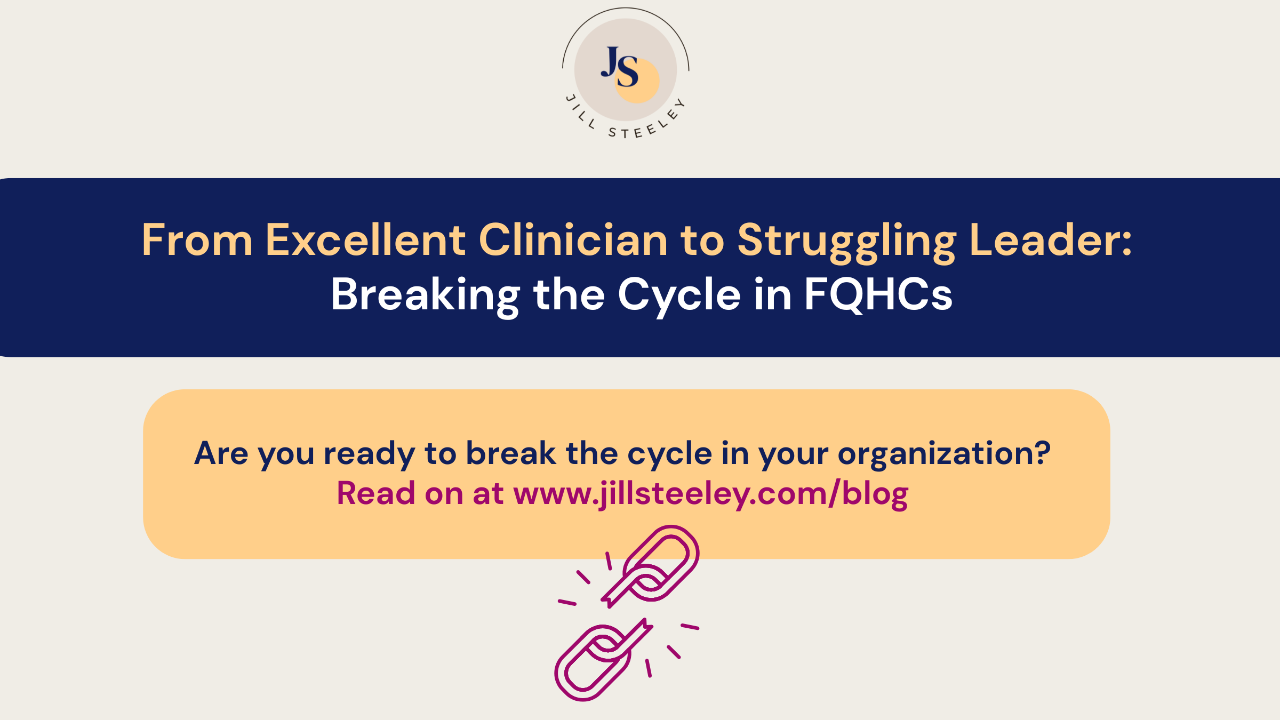
The phone call started like too many others I receive. A regional medical director at a large FQHC was practically in tears, describing a transformation that's become all too common in our industry.
"I used to love my job, but lately I dread coming to work."
Her story is one I've heard countless times: An exceptional clinician promoted to leadership, now drowning in responsibilities she was never trained to handle. The transition from patient care to managing providers, schedules, and team dynamics had left her feeling overwhelmed and unsuccessful.
"We don't learn leadership skills in medical school," she said, voicing a truth that cuts to the heart of a systemic problem in healthcare leadership.
The FQHC Leadership Paradox
FQHCs face a perfect storm when it comes to leadership development:
The Challenge:
- Must maintain fully staffed leadership teams
- Operate on razor-thin margins
- Face ongoing recruitment challenges for clinicians
- Need leaders who understand both clinical excellence and operational demands
The Reality: Finding experienced clinicians who also possess strong leadership skills is nearly impossible. The result? We promote our best clinical performers into management roles and hope they'll figure it out.
The Consequence: We're inadvertently setting our highest performers up to fail.
The Hidden Cost of Unprepared Leaders
When clinical leaders struggle, the ripple effects are significant:
- Administrative Overload: Directors drowning in paperwork and compliance requirements
- Time Management Issues: Missed deadlines and inefficient processes
- Team Dysfunction: Poor communication and interpersonal conflicts
- Cultural Problems: Either micromanagement or complete lack of direction
- High Turnover: The number one reason employees leave is their supervisor
Why This Pattern Persists
The promotion of clinicians to leadership roles without proper preparation isn't malicious—it's systemic. Health centers need leaders who understand the clinical environment, regulatory requirements, and patient population. Who better than someone who's excelled in providing care?
However, clinical excellence doesn't automatically translate to leadership effectiveness. The skills that make someone an outstanding provider—attention to detail, clinical judgment, patient focus—don't necessarily prepare them for:
- Managing diverse personalities and work styles
- Balancing productivity with quality
- Navigating difficult conversations
- Strategic planning and resource allocation
- Creating accountability without micromanaging
The Solution: Intentional Leadership Development
The transformation doesn't have to be painful. With proper support and training, clinicians can successfully transition to effective leadership roles. Here's what makes the difference:
Foundation Building:
- Understanding different leadership styles and when to use them
- Communication skills for difficult conversations
- Time management and delegation strategies
- Conflict resolution techniques
- Change management strategies
- People-First Leadership
Practical Application:
- Role-playing common scenarios
- Developing systems for accountability
- Creating efficient workflows
- Building team engagement strategies
Ongoing Support:
- Regular coaching sessions
- Peer learning opportunities
- Problem-solving partnerships
- Continuous skill refinement
Breaking the Cycle
If your organization is caught in this cycle—promoting excellent clinicians who then struggle as leaders—you're not alone. But you don't have to accept it as inevitable.
Consider these questions:
- How many of your clinical directors received formal leadership training before their promotion?
- What support systems exist for new leaders in your organization?
- How do you measure leadership effectiveness beyond clinical metrics?
- What's the true cost of leadership turnover in your organization?
Moving Forward
The solution isn't to stop promoting clinicians to leadership roles—their clinical expertise is invaluable. Instead, we need to invest in their leadership development with the same intentionality we apply to clinical training.
When we provide proper leadership development, we see:
- Improved employee retention
- Better team dynamics
- More efficient operations
- Reduced leadership burnout
- Enhanced organizational culture
Your best clinicians can become your best leaders—but only if we give them the tools they need to succeed.
The question isn't whether you can afford to invest in leadership development. The question is whether you can afford not to.
Are you ready to break the cycle in your organization? Leadership development isn't just about individual growth—it's about transforming your entire organizational culture and improving patient care outcomes. Email me at [email protected] to talk about how we can partner together to support and train your leaders and aspiring leaders.
Do you want FQHC business strategy tips and other free leadership coaching advice delivered straight to your inbox every week?
Just fill out the form and click the button below to subscribe to get loads of valuable advice from me!
We hate SPAM. We will never sell your information, for any reason.



